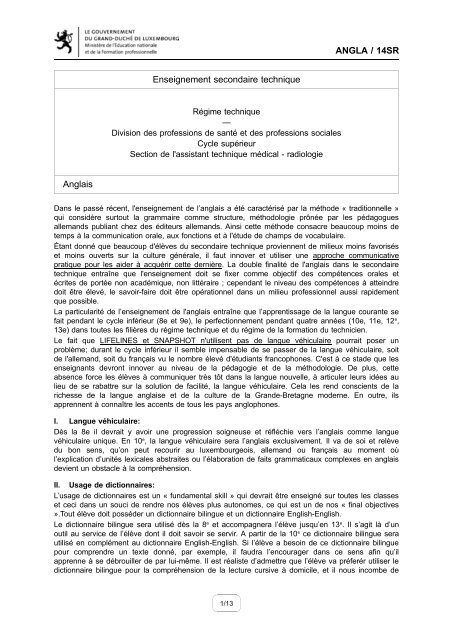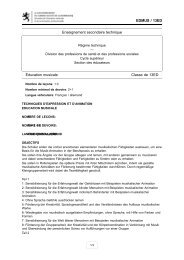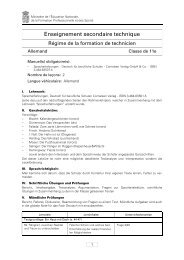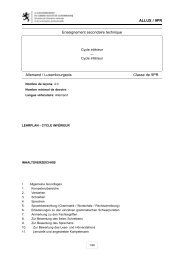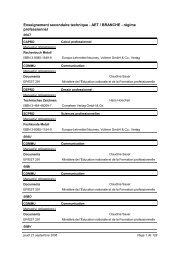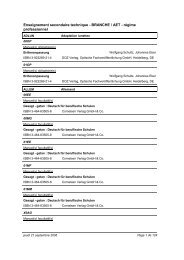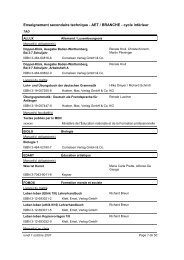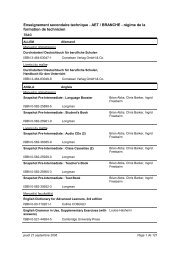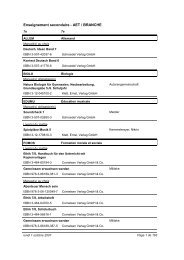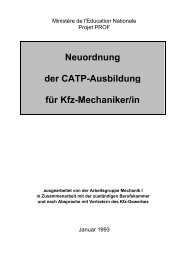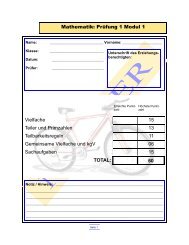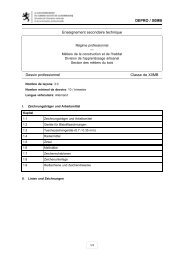mendoc 1..13
mendoc 1..13
mendoc 1..13
You also want an ePaper? Increase the reach of your titles
YUMPU automatically turns print PDFs into web optimized ePapers that Google loves.
Anglais<br />
Enseignement secondaire technique<br />
Régime technique<br />
—<br />
Division des professions de santé et des professions sociales<br />
Cycle supérieur<br />
Section de l'assistant technique médical - radiologie<br />
1/13<br />
ANGLA / 14SR<br />
Dans le passé récent, l'enseignement de l’anglais a été caractérisé par la méthode « traditionnelle »<br />
qui considère surtout la grammaire comme structure, méthodologie prônée par les pédagogues<br />
allemands publiant chez des éditeurs allemands. Ainsi cette méthode consacre beaucoup moins de<br />
temps à la communication orale, aux fonctions et à l'étude de champs de vocabulaire.<br />
Étant donné que beaucoup d'élèves du secondaire technique proviennent de milieux moins favorisés<br />
et moins ouverts sur la culture générale, il faut innover et utiliser une approche communicative<br />
pratique pour les aider à acquérir cette dernière. La double finalité de l'anglais dans le secondaire<br />
technique entraîne que l'enseignement doit se fixer comme objectif des compétences orales et<br />
écrites de portée non académique, non littéraire ; cependant le niveau des compétences à atteindre<br />
doit être élevé, le savoir-faire doit être opérationnel dans un milieu professionnel aussi rapidement<br />
que possible.<br />
La particularité de l’enseignement de l'anglais entraîne que l’apprentissage de la langue courante se<br />
fait pendant le cycle inférieur (8e et 9e), le perfectionnement pendant quatre années (10e, 11e, 12 e ,<br />
13e) dans toutes les filières du régime technique et du régime de la formation du technicien.<br />
Le fait que LIFELINES et SNAPSHOT n'utilisent pas de langue véhiculaire pourrait poser un<br />
problème; durant le cycle inférieur il semble impensable de se passer de la langue véhiculaire, soit<br />
de l'allemand, soit du français vu le nombre élevé d'étudiants francophones. C'est à ce stade que les<br />
enseignants devront innover au niveau de la pédagogie et de la méthodologie. De plus, cette<br />
absence force les élèves à communiquer très tôt dans la langue nouvelle, à articuler leurs idées au<br />
lieu de se rabattre sur la solution de facilité, la langue véhiculaire. Cela les rend conscients de la<br />
richesse de la langue anglaise et de la culture de la Grande-Bretagne moderne. En outre, ils<br />
apprennent à connaître les accents de tous les pays anglophones.<br />
I. Langue véhiculaire:<br />
Dès la 8e il devrait y avoir une progression soigneuse et réfléchie vers l’anglais comme langue<br />
véhiculaire unique. En 10 e , la langue véhiculaire sera l’anglais exclusivement. Il va de soi et relève<br />
du bon sens, qu’on peut recourir au luxembourgeois, allemand ou français au moment où<br />
l’explication d’unités lexicales abstraites ou l’élaboration de faits grammaticaux complexes en anglais<br />
devient un obstacle à la compréhension.<br />
II. Usage de dictionnaires:<br />
L’usage de dictionnaires est un « fundamental skill » qui devrait être enseigné sur toutes les classes<br />
et ceci dans un souci de rendre nos élèves plus autonomes, ce qui est un de nos « final objectives<br />
».Tout élève doit posséder un dictionnaire bilingue et un dictionnaire English-English.<br />
Le dictionnaire bilingue sera utilisé dès la 8 e et accompagnera l’élève jusqu’en 13 e . Il s’agit là d’un<br />
outil au service de l’élève dont il doit savoir se servir. A partir de la 10 e ce dictionnaire bilingue sera<br />
utilisé en complément au dictionnaire English-English. Si l’élève a besoin de ce dictionnaire bilingue<br />
pour comprendre un texte donné, par exemple, il faudra l’encourager dans ce sens afin qu’il<br />
apprenne à se débrouiller de par lui-même. Il est réaliste d’admettre que l’élève va préferér utiliser le<br />
dictionnaire bilingue pour la compréhension de la lecture cursive à domicile, et il nous incombe de
2/13<br />
ANGLA / 14SR<br />
l’encourager à lire et à lire encore et non pas de le décourager en le forçant à utiliser un dictionnaire<br />
English-English exclusivement. Pour la rédaction de sa réponse il aura de plus en plus recours au<br />
dictionnaire English-English.<br />
Le dictionnaire English-English sera le dictionnaire principal à utiliser dès la 10 e . Pour bien guider<br />
l’élève dans l’utilisation de cet outil indispensable, il faudra faire des activités appropriées en classe.<br />
Malheureusement les manuels qui figurent au programme actuellement n’y accordent que peu de<br />
place. Un échange d’exercices / activités parmi les membres de la CN, qui les distribueront à leurs<br />
collègues, serait donc le bienvenu. Le titulaire peut décider de laisser ses élèves utiliser le<br />
dictionnaire pendant les devoirs en classe.<br />
III. L’oral<br />
Chaque année, les enseignants constatent que le nombre d'élèves faisant l'oral anglais au BAC<br />
technique est négligeable. La commission nationale recommande à tous les titulaires de faire 1 test<br />
oral par année comptant comme un devoir écrit (selon les critères appliqués au BAC, voir « Marking<br />
Scales » sub programmes des 13es) à partir de la 11e technique et à partir de la 12e technicien. Le<br />
test oral se fera dans la mesure du possible pendant les heures de classe de sorte à ne pas trop<br />
déranger le déroulement des autres cours et à ne pas surcharger les élèves. Ils seront convoqués<br />
individuellement et pourront être testés de la manière suivante:<br />
– écouter brièvement une histoire courte sur cassette, regarder un extrait vidéo et résumer le<br />
contenu en le reformulant<br />
– répondre à des questions précises concernant le contenu de ces cassettes<br />
– répondre à des questions de compréhension concernant une matière déterminée à réviser<br />
– construire un dialogue avec un partenaire (un autre élève)<br />
– test oral calqué sur l’examen oral en 13 e<br />
IV. La lecture cursive<br />
Dans la période d’apprentissage et de perfectionnement (8e-12e), la lecture cursive constitue un<br />
instrument essentiel ayant comme objectifs:<br />
– la compréhension des structures de la phrase<br />
– l'apprentissage de la prononciation exacte par la répétition<br />
– l'acquisition d'un sens de la prononciation de mots inconnus<br />
– l'appréciation critique de thèmes actuels<br />
– les connaissances socioculturelles<br />
– la compréhension de l'ampleur d'un ouvrage en entier<br />
– la rédaction de réponses / textes plus longs obligeant l’élève a prendre en compte l’intégralité<br />
d’un ouvrage<br />
– l'intérêt pour la lecture en général.<br />
Adaptée au niveau linguistique et intellectuel des élèves (abridged, short stories), la lecture est une<br />
partie intégrante très positive des cours à partir du cycle inférieur.<br />
V. La grammaire (Voir aussi XI ci-dessous)<br />
ENGLISH GRAMMAR IN USE est à considérer à partir de la 10e avant tout comme un outil pratique<br />
d’accompagnement que le titulaire pourra utiliser en vue d’une révision et d’un renforcement<br />
(respectivement d’un approfondissement) des points grammaticaux expliqués dans le manuel de<br />
base LIFELINES et en classe. A partir de la 10e, le titulaire y traitera les chapitres, respectivement<br />
exercices, en relation immédiate avec la grammaire exposée dans LIFELINES, mais pourra aussi<br />
choisir d’y traiter d’autres points grammaticaux en vue d’une amélioration ponctuelle de l’expression<br />
écrite ou orale de ses élèves. Il adaptera de toute façon le nombre et le choix des exercices à faire<br />
dans ENGLISH GRAMMAR IN USE au niveau de sa classe et au temps à sa disposition et guidera<br />
les élèves dans l’usage de ce manuel. L’usage d’un manuel de référence de grammaire est un «<br />
fundamental skill » qui devrait être enseigné sur toutes les classes et ceci dans un souci de rendre<br />
nos élèves plus autonomes, ce qui est un de nos « final objectives ».<br />
VI. Activités favorisant la compréhension et la rédaction
3/13<br />
ANGLA / 14SR<br />
Les membres de la CNP estiment qu’il est grand temps de tourner le dos à l’usage exaggéré de gapfilling<br />
activities au profit d’activités plus complètes, plus stimulantes et favorisant un travail et une<br />
attitude plus autonomes. (Ceci n’exclut pas le travail en groupe)<br />
La lecture cursive s’y prête bien et servira aussi à accroître le vocabulaire de nos élèves, ce qui est<br />
très important. Là aussi il faut aider nos élèves à devenir plus autonomes. Il faut qu’ils réalisent qu’un<br />
vocabulaire assez étoffé leur facilitera la compréhension et la rédaction de textes, bref, la<br />
communication. Pour encourager cette attitude, des activités comme brainstorming, mind-mapping,<br />
looking for semantic cues, inferring meaning from context, finding positive or negative connotations,<br />
linguistic chunking (collocations, expressions), etc. peuvent s’avérer utiles. N’oublions pas de préciser<br />
que les élèves doivent naturellement apprendre des vocables.<br />
Les membres pensent aussi que la traduction a été délaissée comme activité utile dans la salle de<br />
classe et dans les devoirs (Vocabulaire, tenses, conscience des différences entre certains usages de<br />
la langue maternelle et de l’anglais, faux-amis etc.)<br />
Il en va de même pour la reproduction écrite d’un texte que les élèves écoutent en classe et des<br />
activités apparentées comme le note-taking, drafting and composition dont le but est d’apprendre<br />
aux élèves comment se débrouiller pour extraire les points essentiels, les reformuler correctement et<br />
d’une façon cohérente par écrit.<br />
Bref, les listening and reading comprehension skills ainsi que les writing skills sont à revaloriser<br />
ensemble avec les oral communication skills.<br />
VII. Autres activités:<br />
– incorporer des activtés (textes, films, etc) promouvant la “mobilité et sécurité sur la route”<br />
(Fiches, infos, CDs disponibles au MENFPS)<br />
– research in library, via wwweb<br />
– exposés, dialogues acted out in class<br />
– les “Extension reading” dans Lifelines peuvent être remplacés par des textes relatifs à la<br />
“spécificité de la section”, excepté pour les “Extension reading” qui font parti de la matière à<br />
réviser pour l’examen.<br />
Ainsi, le titulaire dispose d'une structure continue de la 8e à la 12e, d'un support didactique au sein<br />
duquel il a la possibilité de s’épanouir et de fixer ses priorités en fonction de l’homogénéité de son<br />
groupe, de sa personnalité. L’apprentissage d'une langue nouvelle à un élève jeune ou adulte<br />
comprend plusieurs phases et ingrédients dont la pondérance dépend de la méthode choisie, la<br />
personnalité de l'enseignant et des objectifs à atteindre.<br />
Au cycle inférieur, l'enseignant travaille surtout selon les champs d'action ci-dessous:<br />
– champs de vocabulaire<br />
– grammaire / exercices de rédaction<br />
– fonctions / jeux de rôle simples<br />
– exercices de prononciation<br />
– jeux<br />
– compréhension de la lecture<br />
– exercices d'écoute (audio / vidéo)<br />
sans trop avoir recours aux exercices de type « gap-filling » pour autant.<br />
Last, not least, la commission nationale doit être souple dans le sens que les manuels jugés<br />
inadaptés par la majorité des titulaires doivent être remplacés rapidement, même après une seule<br />
année scolaire, si nécessaire.<br />
VIII. Degré de difficulté
4/13<br />
ANGLA / 14SR<br />
a) Pour toutes les divisions du régime technique, le degré de difficulté recommandé est de:<br />
1:1.5<br />
b) Pour toutes les divisions de la formation de technicien, excepté CM (1leçon supplém.,<br />
Anglais plus important), le degré de difficulté recommandé est de:<br />
– 1:1 to 1:1.3 suivant la nature et la complexité de la tâche. Par exemple: pour des exercices<br />
grammaticaux et des exercices de vocabulaire on posera 13 difficultés (verbes, vocables, etc.)<br />
pour 10 points.<br />
c) Pour la division administrative et commerciale de la formation de technicien, le degré de<br />
difficulté recommandé est de:<br />
– (1:1 to) 1:1.3 suivant la nature et la complexité de la tâche, mais tendant vers 1:1.3 (1 leçon de<br />
plus que les autres divisions)<br />
d) T3xx exam:<br />
– 1:1 (Class Tests: see above 1:1 - 1:1.3)<br />
– see also T3xx dans Horaires et Programmes<br />
e) T3CM exam:<br />
– 1:1.3 (Class Tests: see above 1:1 - 1:1.3)<br />
– see also T3CM dans Horaires et Programmes<br />
IX. Grammaire en régime technique: 13 GE / GI / SL / SR / SI - Vue synoptique<br />
EX à exam (faits grammaticaux à maîtriser absolument par les élèves, car ces points peuvent<br />
faire partie de l’exercice grammatical à l’ examen de fin d’études)<br />
CW à classwork (grammaire supposée connue en 13e mais pas au programme de l’examen;<br />
cependant cette liste n’est pas exhaustive concernant les points grammaticaux à traiter à<br />
partir de la 8e, selon la progression inhérente aux manuels de base, respectivement celle<br />
affichée dans les programmes des classes respectives)<br />
NO à not on the programme (faits grammaticaux à ne pas traiter en classe)<br />
1. PRESENT, PAST AND FUTURE TENSES<br />
THE PRESENT<br />
Present Simple active EX<br />
Present Simple passive EX<br />
– to express facts, general truths, etc.: The earth goes round the sun. EX<br />
– to express habits, regular activities, etc.: I usually play football on Sundays. EX<br />
– to describe events that happen one after the other, i.e. in sports commentaries,<br />
narratives, etc.: He kicks the ball, passes two players, kicks the ball again, and<br />
shoots.<br />
– in newspaper headlines: Superjhemp rescues Prime Minister! EX<br />
– for future and in time clauses, see below !<br />
Present Continuous active EX<br />
Present Continuous passive EX<br />
EX
– to express an action in progress at the time of speaking: Look! He’s decorating<br />
the Christmas tree.<br />
– the action is happening around the time of speaking (but may not be in progress<br />
at this precise moment): This weekend the shops are closing at nine.<br />
– They are building a hospital over there.<br />
– when we feel that an activity is happening too often (with words like always,<br />
continually, constantly, forever etc.); to express our anger about this: I’m always<br />
losing things!<br />
– for future, see below !<br />
Present Perfect Simple active EX<br />
Present Perfect Simple passive EX<br />
– to describe a finished past action with a result in the present: I’ve lost my wallet. EX<br />
– to express actions that extend from the past into the present (when we talk about<br />
an unfinished period of time): I have lived in Luxembourg since 1988.<br />
– when we talk of sth. as part of someone’s life: I’ve never been to Scotland. EX<br />
– for an action that has only just happened EX<br />
Present Perfect Continuous active EX<br />
Present Perfect Continuous passive NO<br />
– for incomplete activities, activities that continue in the present and/or future: He’s<br />
been smoking a lot recently.<br />
– to emphasize the duration of an action: They have been writing Christmas cards<br />
all day!<br />
– to describe a temporary activity that has only just stopped but has had a vivid<br />
and often unintended effect on the present: How dirty you are! Have you been<br />
playing in the mud again?<br />
THE PAST<br />
Past Simple active EX<br />
Past Simple passive EX<br />
– to express actions that are definitely over (often with time references): He died<br />
last year.<br />
– to ask a question about finished past time: When were you born? How did you<br />
do that? Did you know that Marilyn Monroe committed suicide?<br />
– to describe past events or a series of actions that happened one after the other,<br />
i.e. in stories, narratives, etc.: She got up, went to the bathroom and had a<br />
shower.<br />
– to describe past habits: I often went to the cinema when I was young. EX<br />
Past Continuous active EX<br />
Past Continuous passive EX<br />
– to express that an action was in progress in the past or to describe a scene or<br />
situation at a certain time in the past: The sun was shining when I stepped off<br />
the bus. When he got home, she was making tea.<br />
5/13<br />
ANGLA / 14SR<br />
EX<br />
EX<br />
CW<br />
EX<br />
EX<br />
EX<br />
EX<br />
EX<br />
EX<br />
EX<br />
EX
– when we feel that an activity was repeated too often in the past (with words like<br />
always, continually, constantly, forever etc.); to express our anger about this: He<br />
was constantly arriving late!<br />
Past Perfect Simple active EX<br />
Past Perfect Simple passive EX<br />
– to describe actions that happened before a certain time in the past: When I woke<br />
up, he had left.<br />
– as the past form of the Present Perfect (to express results in the past, to talk<br />
about events that had only just happened at a certain time in the past, …)<br />
Past Perfect Continuous active EX<br />
Past Perfect Continuous passive EX<br />
– for activities that happened over a certain period of time up to a particular time in<br />
the past: When I met him, I had been studying English for 2 years.<br />
– to emphasize the duration of an action that happened before a certain time in the<br />
past: They had been chopping wood for hours when Sally arrived.<br />
THE FUTURE + TIME CLAUSES<br />
Present Simple as future (active) EX<br />
– to refer to timetables, programmes, schedules, journeys, etc.: My train leaves at<br />
nine.<br />
– in time clauses: What are you going to do when you leave school? EX<br />
Present Perfect Simple (active) EX<br />
– in time clauses: When you have written your exercises, you can go to the<br />
cinema.<br />
Present Continuous as future (active) EX<br />
– to talk about a fixed plan or definite arrangement: We are meeting Robert for<br />
lunch next Thursday.<br />
– to ask about future arrangements: Are you coming to Tom’s party tonight? EX<br />
‘going to’-Future (active) EX<br />
‘going to’-Future (passive) EX<br />
– for deductions or predictions based on present evidence: Look at those clouds!<br />
It’s going to rain.<br />
– to express an intention or a plan that exists at the time of speaking: I’m going to<br />
study English when I leave school.<br />
‘will’-Future (active) EX<br />
‘will’-Future (passive) EX<br />
– for sudden or spontaneous decisions: We haven’t got sugar. I’ll go and buy<br />
some.<br />
– to predict things we cannot influence: There will always be selfish people in the<br />
world. Father Christmas will come on Sunday.<br />
6/13<br />
ANGLA / 14SR<br />
CW<br />
EX<br />
EX<br />
EX<br />
EX<br />
EX<br />
EX<br />
EX<br />
EX<br />
EX<br />
EX<br />
EX
– to express one’s personal opinion or conviction, or to express a mere supposition<br />
about the future: I’m certain I will succeed. Perhaps you will fail. Do you think he<br />
will pass his exam?<br />
– for promises, threats, warnings, etc.: I will always love you. EX<br />
Future Continuous (active) EX<br />
Future Continuous (passive) NO<br />
– to talk about activities in progress at a particular time in the future: Between nine<br />
and ten, we will be having dinner.<br />
– to express that sth. will happen in the ordinary course of events, as a matter of<br />
routine: As usual, Tom will be staying with his aunt in the Easter holidays.<br />
– to ask about people’s plans in a polite way: Excuse me, will you be using the<br />
computer for much longer?<br />
Future Perfect Simple (active) EX<br />
Future Perfect Simple (passive) EX<br />
– to talk about a completed activity in the future: By the year 2040, the world<br />
population will have reached 7 billion.<br />
OTHER POINTS RELATING TO THE USE OF TENSES AND VERB-FORMS<br />
Pupils must have a good knowledge of the difference between static and active<br />
verbs so that they know when not to use the continuous form. In this context,<br />
they should notice when a verb is static and when a verb is active rather than<br />
be made to memorize lists of selected verbs.<br />
Pupils should be aware of the following static verbs that can take the<br />
continuous form depending on the situation.<br />
– to have: Look! John has a new girlfriend. but: He was having lunch (a drink, a<br />
shower, a bath, fun, etc.) when the lights went out.<br />
– to think: I don’t think he is that stupid. but: I am thinking of selling my car. EX<br />
– to see: Look! Do you see that man over there? but: I am seeing my dentist<br />
tomorrow.<br />
– to be: He is in town at the moment. but: Stop this! You are being very silly ! CW<br />
– to smell + to taste: This soup tastes / smells good. but: Look! He is tasting / is<br />
smelling the soup.<br />
– to guess: I guess you are right. but: You don’t know. You are just guessing. CW<br />
Pupils must be able to use adverbials such as usually, often, always, already,<br />
yet, still, etc. correctly and to put them into the correct position in relation to<br />
the verb-forms they use in tense exercises.<br />
– Emma (not visit) (already / yet) him.<br />
– They (go / usually) to the cinema on Sundays.<br />
– He (be / completely) exhausted when night broke.<br />
– He (never / be) to Paris in his life.<br />
2. TENSE USAGE IN CONDITIONALS<br />
IF-SENTENCES EX<br />
7/13<br />
ANGLA / 14SR<br />
EX<br />
EX<br />
NO<br />
NO<br />
EX<br />
EX<br />
EX<br />
EX<br />
EX<br />
CW<br />
EX<br />
EX
0-type: general EX<br />
– If (When) you heat ice, it turns to water. EX<br />
type 1: possible or probable EX<br />
– I will go to university if I pass my exam. EX<br />
type 2: imaginary or improbable EX<br />
– If I had a pen I would lend it to you. EX<br />
– If I were you, I wouldn’t do this. EX<br />
type 3: impossible or past EX<br />
– This wouldn’t have happened if you had been here. EX<br />
mixed types CW<br />
8/13<br />
ANGLA / 14SR<br />
– If you had brought a map, we would know where we are. X. CW<br />
use of words and conjunctions other than ‘if’ CW<br />
– unless: We will go swimming unless it rains. XI. CW<br />
– imagine: Imagine you didn’t have to come to school tomorrow, what would you<br />
do?<br />
use of inversion instead of ‘if’ CW<br />
– Had I known you were ill, I would have visited you. CW<br />
3. TENSES IN HYPOTHESES, WISHES, REGRETS<br />
HYPOTHESES, WISHES, REGRETS, etc. EX<br />
wishes about a present situation EX<br />
– I wish I knew his address. EX<br />
wishes or regrets about a past situation EX<br />
– I wish you had asked my advice about this last week. EX<br />
wishes with ‘would’ NO<br />
– I wish it would stop raining! but: I wish I had would have more money. NO<br />
‘imagine’ + ‘if only’ CW<br />
– Imagine you were fifty years older.<br />
– If only he weren’t so lazy!<br />
‘it’s high time’ , ‘it’s about time’ CW<br />
– It’s about time he changed his behaviour.<br />
– It’s high time you spoke to him.<br />
‘would rather’ NO<br />
– I would rather you didn’t smoke here. NO<br />
4. ACTIVE VERSUS PASSIVE VOICE<br />
CW<br />
CW<br />
CW
VERB-FORMS PUPILS MUST BE ABLE TO USE IN THE PASSIVE<br />
9/13<br />
ANGLA / 14SR<br />
tenses pupils must be able to use in the passive see 1)<br />
above<br />
modal auxiliaries they must be able to use in the passive auxiliaries<br />
under 6)<br />
below<br />
gerund and infinitive constructions in the passive NO<br />
– He hates people telling him what to do. à He hates being told what to do. He<br />
didn’t want the police to catch him. à He didn’t want to be caught by the police.<br />
TRANSFORMATIONS FROM ACTIVE TO PASSIVE EX<br />
sentences with one object EX<br />
– John called an ambulance. à An ambulance was called by John. EX<br />
sentences with a prepositional object EX<br />
– They have talked about the problem. à The problem has been talked about. EX<br />
sentences with verbs that can take two objects, such as offer, give, show, bring,<br />
lend, promise, send, tell<br />
They offered John a cup of tea. à 1) John was offered a cup of tea. 2) A cup of tea<br />
was offered to John.<br />
sentences with verbs that can take two objects such as explain, announce,<br />
describe, distribute, but where the indirect object must be added with ‘to’<br />
– They explained the situation to me. à The situation was explained to me. EX<br />
sentences with ‘anybody’ or ‘anything’ as object EX<br />
– He didn’t say anything. à Nothing was said. EX<br />
questions (without question words) EX<br />
– Did they inform him? à Was he informed? EX<br />
questions with question words EX<br />
– Why did they not inform him? à Why wasn’t he informed? EX<br />
questions with ‘who’, etc. as subject of the question CW<br />
Who offered him a cup of tea? à 1) Who was he offered a cup of tea by? 2) By<br />
whom was he offered a cup of tea?<br />
special constructions with think, say, claim, know, etc. NO<br />
– They say he is the best doctor in town. à He is said to be the best doctor in<br />
town.<br />
TRANSFORMATIONS FROM PASSIVE TO ACTIVE NO<br />
5. RELATIVE CLAUSES<br />
DEFINING RELATIVE CLAUSES EX<br />
Subject case: He was the best king who / that ever sat on the throne. EX<br />
Object case: This is the postcard (which / that) my brother sent me. EX<br />
NO<br />
EX<br />
EX<br />
EX<br />
CW<br />
NO
Prepositional case: The lady (who / that) I spoke to was tall. / The lady to whom I<br />
spoke was tall.<br />
Possessive case: Children whose parents are rich are often spoilt. Our house is the<br />
one whose windows are open. Our house is the one the windows of which …<br />
NON-DEFINING RELATIVE CLAUSES EX<br />
Subject case: My new camera, which was rather expensive, takes wonderful pictures. EX<br />
Object case: She introduced me to John, who / whom I hadn’t met before. EX<br />
Prepositional case: Mr Philby, who / whom he works for, is very generous. Mr Philby,<br />
for whom he works, …<br />
Possessive case: These children, whose parents are film stars, are spoilt. EX<br />
SPECIAL CONSTRUCTIONS EX<br />
use of ‘where’ and ‘when’ as relative pronouns EX<br />
– We visited the town where Shakespeare lived. EX<br />
use of ‘which’ to refer to a whole clause EX<br />
– We had missed the last train , which made me very angry. EX<br />
‘most of whom’, ‘some of which’, ‘none of which’, ‘three of whom’, etc. CW<br />
– Shadow of a Vampire is a very bad film. Part of it was shot in Vianden. à<br />
Shadow of a Vampire, part of which was shot in Vianden, is a very bad film.<br />
‘which is why’ CW<br />
– They behaved badly. That’s why we punished them. à They behaved badly,<br />
which is why we punished them.<br />
6. MODAL AUXILIARIES AND THEIR SUBSTITUTES<br />
MODAL AUXILIARY VERBS + THEIR SUBSTITUTES EX<br />
strong obligation: must + have to EX<br />
– difference between must and have to EX<br />
no obligation: not have to / not need to + needn’t have to EX<br />
– I don’t have to / don’t need to go to school today.<br />
– I didn’t have to go / didn’t need to go to school yesterday.<br />
– I needn’t have bought that book. They have it at the local library. EX<br />
– difference between needn’t have and didn’t need to EX<br />
permission: may / can + be allowed to EX<br />
– May / Can I open the window? EX<br />
– difference between may and can CW<br />
– I was allowed to open the window yesterday. EX<br />
prohibition: mustn’t / may not + not be allowed to EX<br />
10/13<br />
ANGLA / 14SR<br />
EX<br />
EX<br />
EX<br />
CW<br />
CW<br />
EX
– You mustn’t / may not smoke in here. EX<br />
– I wasn’t allowed to smoke during the train journey. EX<br />
ability: can + could + be able to EX<br />
– He can read and write. EX<br />
– He could read and write when he was four. EX<br />
– They were able to rescue her. EX<br />
– difference between could and was/were able to: After a few seconds, I could<br />
smell gas. But: He was able to break his own record yesterday.<br />
negative ability: cannot + could not + not be able to EX<br />
obligation, duty, advice: should / should not EX<br />
– He should go to bed earlier. EX<br />
– He should have gone to bed earlier yesterday. EX<br />
obligation, duty, advice: ought to / ought not to CW<br />
possibility: may / may not EX<br />
remote possibility: might / might not CW<br />
– difference between might and may CW<br />
deduction or speculation: positive: must negative: can’t EX<br />
– He spends a lot of money. He must be rich.<br />
– She hates school. She can’t be a very good pupil.<br />
– There’s nobody at home. They must have gone on holiday.<br />
– The weather was very bad. They can’t have enjoyed their trip to the mountains.<br />
habit: used to / didn’t use to EX<br />
TENSES + FORMS pupils should be able to use modals (or substitutes) in: EX<br />
PRESENT TENSE EX<br />
PAST TENSE EX<br />
A. PRESENT PERFECT TENSE EX<br />
WILL-FUTURE EX<br />
CONTINUOUS FORM: should be doing, must be going, can’t be leaving, etc. NO<br />
7. REPORTED SPEECH<br />
TRANSFORMING DIRECT SPEECH INTO REPORTED SPEECH EX<br />
reporting verb is in a past tense and pupil must be aware of how to change<br />
tenses in reported speech<br />
– Sally said / was saying: “I like English”. EX<br />
reporting verb can be in a present or future tense (à no tense changes) EX<br />
– Sally says / has said / will say: “I like English”. EX<br />
putting statements into reported speech EX<br />
11/13<br />
ANGLA / 14SR<br />
EX<br />
EX<br />
EX<br />
EX
putting questions into reported speech EX<br />
putting commands, requests, etc into reported speech EX<br />
12/13<br />
ANGLA / 14SR<br />
tenses that can be used (in exercises on reported speech) see 1)<br />
above<br />
auxiliaries that can be used (in exercises on reported speech) see 6)<br />
above<br />
knowledge of reporting verbs other than ‘say’, ‘ask’ and ‘tell’ required: to add,<br />
to accuse, to advise, to admit, to answer, to announce, to apologize, to<br />
complain, to deny, to explain,o remind, to reply, to remark, to declare, to state,<br />
to insist, to persuade, to point out, to refuse, to shout, to threaten, to exclaim,<br />
to murmur, to whisper, to remind so, to offer, to promise, to suggest, to<br />
propose; to inquire, to want to know; to order, to command, to urge, to<br />
encourage, to warn, to invite;<br />
pupils must know how to change time indicators when necessary EX<br />
– now à then<br />
– today à that day<br />
– tonight à that night<br />
– yesterday à the day before / the previous day<br />
– the day before yesterday à two days before<br />
– tomorrow à the next / following day<br />
– the day after tomorrow à in two days’ time<br />
– next week, year, … à the following week, year …<br />
– last week, year, … à the previous week, year, …<br />
– a year, week … ago à a year, week … before<br />
pupils must know how to change place indicators when necessary EX<br />
– here à there<br />
– this (room, …) à that (room,…)<br />
reporting exclamations, wishes, fixed expressions, emotions, shades of<br />
meaning<br />
– Hello! Good evening! Good morning! à He greeted me / us / … . CW<br />
– You’re right! à He agreed with me / us / … . CW<br />
– Congratulations! à He congratulated me / us / … . CW<br />
– Help! à He shouted for help. CW<br />
– Thank you! à He thanked me / us / … . CW<br />
– Good luck! à He wished me / us / … .good luck. CW<br />
– Could you please hold the ladder for me? à She asked him politely if he could<br />
hold the ladder for her.<br />
– Please, please, listen to me. à He begged her to listen to him. CW<br />
– Stop crying, you fool! à She angrily ordered him to stop crying. CW<br />
TRANSFORMING REPORTED SPEECH INTO DIRECT SPEECH NO<br />
CW<br />
EX<br />
EX<br />
CW<br />
CW
8. PARTICIPLES<br />
USING PRESENT PARTICIPLE CONSTRUCTIONS EX<br />
filling in present participles where necessary EX<br />
– to leave, to keep, to catch, to find: They kept us waiting. She left her blouse lying<br />
on a chair.<br />
– to sit, to stand, to lie, to remain, to stay, to go, to come, to walk, to run: She<br />
stayed talking to me after the party. Somebody came running up to me while I<br />
stood at the corner waiting.<br />
– There is + noun + -ing: There is a man climbing through your window. EX<br />
combining sentences with the help of present participles EX<br />
– First he ordered a drink. Then he pulled out a newspaper à 1) Having ordered a<br />
drink, he pulled out a newspaper 2) After ordering a drink, he pulled out a<br />
newspaper.<br />
reformulating sentences with the help of participles CW<br />
– Because you have never had a machine like this, you will be surprised by what it<br />
can do. à Never having had a machine like this, you will be surprised by what it<br />
can do. Who was that girl who was talking to you? à Who was that girl talking to<br />
you? Misrelated participles: Reading in bed my hands get cold. à Reading in<br />
bed I get cold hands.<br />
USING PAST PARTICIPLE CONSTRUCTIONS<br />
– I like cars made in Italy. I saw a made arrested by the police.<br />
– The information which was given to me proved to be wrong. à The information<br />
given to me proved to be wrong.<br />
– to have (get) something done CW<br />
9. GERUND AND INFINITIVE<br />
13/13<br />
ANGLA / 14SR<br />
1. 13es GE / GI / SI / SL / SR pupils are referred to the Gerund / Infinitive rules elaborated for<br />
2.<br />
13ème technicien CM and published in H&P.<br />
The e.g. He prepositions succeeded must (do also / correct be known form) his for the homework. exam. Any missing prepositions should be supplied<br />
by the pupils.<br />
Le programme est valable pour les classes suivantes: 12SR, 13SR, 14SR<br />
EX<br />
EX<br />
CW<br />
CW


